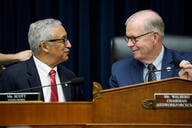You have /5 articles left.
Sign up for a free account or log in.
The presidential campaign has featured considerable debate about free public higher education, student debt and other issues related to the cost of college. But Hillary Clinton and Donald Trump aren't the only ones talking. The Green Party presidential candidate is making a play for Bernie Sanders supporters with a plan to cancel all student debt, while the Libertarian Party nominee has promised to end the Department of Education.
Jill Stein, the Green Party nominee, has said she wants to be the “plan B” for Sanders supporters. For voters excited by Sanders's proposal for free tuition at public universities, Stein made even more ambitious promises: free college, yes, but also the elimination of existing student debt. So far, Johnson is attracting more support in the polls than is Stein. Third-party support tends to drop as Election Day gets closer, but this is in any number of ways an unusual election year.
Green Party
Stein, a Harvard University medical school graduate who practiced internal medicine, has said she would go about eliminating student debt through a monetary policy called quantitative easing -- basically asking the Federal Reserve, an independent government body, to buy up student debt and decline to collect it.
"So essentially it's an expansion of the money supply, but in a way that actually unleashes enormous productivity. This is basically the stimulus package of our dreams," she told CNBC’s Squawk Box.
Clinton’s campaign platform has proposed limiting student debt repayments to no more than 10 percent of a borrower’s income and canceling remaining debt after 10 years.
Stein’s plan is more ambitious -- and could have obvious appeal for many with debt. But proposals to cancel all student debt have received criticism from progressive higher ed policy experts for most benefiting the student borrowers who need help the least.
Alexander Holt, a policy analyst at New America, said canceling all student debt would disproportionately affect a small number of borrowers who have high volumes of student debt. Data show that individuals with higher student debt loads -- often holders of advanced degrees -- tend to have higher incomes and those people are for the most part doing fine, he said.
“It would be more progressive for Jill Stein to just hand out the same amount of money to every American than to just cancel student debt,” Holt said.
A paper from progressive think tank Demos argued last year that student debt is exacerbating racial inequality in the United States. But the paper said that eliminating all student debt would increase the racial wealth gap because the typical white family would see a greater net benefit than the typical black family. A progressive debt cancellation plan would target low-wealth households, it said.
Policy analyst Mark Huelsman, the lead author of the Demos paper, said if he were advising a campaign on devising a progressive debt cancellation policy, he would say to target households at or below median wealth and median income -- about $53,000 for U.S. households in 2014, according to the Census Bureau.
"Student debt forgiveness should not be off the table, but we have to be very intentional and somewhat cautious in terms of how we would employ it," he said.
Libertarian Party
Where Stein wants to end student debt, Gary Johnson, Republican governor of New Mexico from 1995 to 2003, would like to end the U.S. Department of Education -- the body responsible for overseeing federal financial aid programs.
Johnson’s higher ed record includes signing into law a New Mexico lottery program that would pay for college scholarships. But the program has struggled to generate sufficient revenue in recent years, and state lawmakers have been forced to make periodic fixes or cash infusions.
Johnson blames federal student loans for the rising cost of higher education. If guaranteed government student loans never existed, tuition today would be half of what it is, because colleges and universities “would have to go out and attract you as a student,” he told The International Business Times in June.
But he has also called for the refinancing of existing student loans -- a proposal put forward by the Clinton campaign as well. Holt said those comments appear contradictory from a candidate who blames student loans for driving increasing costs in higher education. But he said whether policy experts agree with those proposals, they show candidates across the political spectrum are paying attention to voters’ focus on issues of college cost and student debt.
“Voters have decided this is an important issue and politicians are going to respond,” Holt said.
Melissa Byrne, a former Sanders staffer and longtime organizer on the free college issue, said she thought it was helpful to have more candidates talking about eliminating and reducing student debt. But she said winning victories on an issue takes years of organizing and outreach.
Clinton has also moved closer to Sanders’s free college plan, proposing free tuition at four-year public universities for all families making less than $125,000. That makes it even harder for Stein to draw a major distinction with her campaign, many say.
“Hillary has adopted a big portion of Bernie's plan,” Byrne said. “That has advocates in a really good place to push for more next year.”




